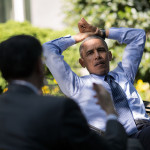via LobeLog
by Mitchell Plitnick
It’s time to ask some tough questions about US policy regarding Egypt. The most pressing being what that policy is, exactly?
I agreed with the easily assailable decision by the Obama administration to refrain from labelling the ouster of Egyptian President Mohammed Morsi a coup. It still [...]
via LobeLog
by Wayne White
Mali finally signed a ceasefire with Tuareg separatists negotiated by the UN and the EU, potentially opening the way for the return of a central government presence to the key Saharan provincial capital of Kidal. Mali also recently secured a major Western aid package. Yet, tensions between the government [...]
The U.S. Military and the Unraveling of Africa
by Nick Turse
via Tom Dispatch
The Gulf of Guinea. He said it without a hint of irony or embarrassment. This was one of U.S. Africa Command’s big success stories. The Gulf… of Guinea.
via Lobe Log
by James A. Russell
With the disappearance of war between developed states in the post-World War II era, policing intra-state violence on land and trying to punish so-called rogue states constitutes the main security problems facing the international community.
As the world’s sole military power capable of global power projection, many [...]
via Lobe Log
by Daniel Luban
The death of Hugo Chavez has triggered a predictably dizzying amount of commentary, and I’ll leave it to the experts to evaluate his complicated legacy in Venezuela and in Latin America more broadly. The accusations of “totalitarianism” from the right were clearly absurd and hypocritical — whatever his [...]
via Lobe Log
by Emile Nakhleh
As President Obama begins his second term and John Kerry becomes the new Secretary of State, they are faced with worrisome uncertainty in Egypt, civil war in Syria, repression in Bahrain, a moribund peace process, and a defiant Iran. In order to help create a stable Middle East [...]
via Lobe Log
As the Arab Spring turns two, job creation offers the key promise of success in post-autocratic societies. While other important lessons could be gleaned from the unprecedented Arab upheavals, economic growth is the most shining one. Unless Washington and other Western capitals understand the criticality of the economic factor and assist [...]
via IPS News
Several critical issues of unfinished business in the Middle East face President Barack Obama as he begins his second term. Washington must become more engaged come January because these issues will directly impact regional stability and security and U.S. interests and personnel in the region.
The issues include the Syrian [...]
via Lobe Log
The Washington Post‘s Greg Miller has begun a three-part series on the future of the Obama Administration’s counterterrorism drone strike program, which will include a “next-generation targeting list” (aka “kill list”) in the form of a “dipposition matrix”.
Though the White House, CIA, JSOC and ODNI declined comment requests, the article cites [...]
via IPS News
Graphic: The figures signify the number of times each country was mentioned in the Oct. 22 presidential debate. Credit: Zachary Fleischmann/IPS
U.S. strategy in the Greater Middle East, which has dominated foreign policy-making since the 9/11 attacks more than 11 years ago, similarly dominated the third and last debate between [...]
En Español
The Latest
 From IPS News
From IPS News- Small Island States Fostering Effective Energy Transition To Achieve a Blue Economy
- Attacks on UNRWA Not About Its Neutrality, Says UNRWA Chief
- US Foreign Policy in Middle East Still Governed by Israeli Priorities
- Rich Nation Hypocrisy Accelerating Global Heating
- Seeking Justice for the Civilian Victims of the Syrian Civil War
- Who Should be the Next UN Leader?PART 7 FINAL
- Will a Two-State Solution include Palestine as a UN Member State?
- UN Live’s CEO Katja Iversen Talks About the Power of Popular Culture and ‘Sounds Right’
- Afghan Women’s Voices Stifled as Taliban Tightens Media Controls
- ‘Toasting the World’s Most Natural Talent’: UN Museum Campaign Recognizes NATURE’s Contributions to Music
- Online fundraising for IPS Inter Press Service at Razoo













